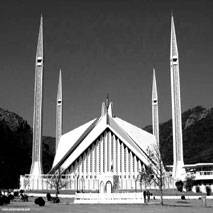Huquq-ul-Ibaad in Islam
HUQUQ-ul Ibaad (The rights of men over men) is the ines capable sine qua non of Islamic dispensation.
Without practicing this essential aspect of Islam, a Muslim cannot attain the status of a true believer.
Unfortunately, from the pulpits of our mosques, this aspect of our religion is hardly propagated and underscored as equally important part of faith as that of Huquq-ul –Allah (The rights of ALLAH). The entire focus of our clerics is on the rights of ALLAH; rarely do they touch upon the subject of Huquq-ul-Ibaad.
However, ninety percent of Islamic teachings revolve around the rights of men over other men. Owing to our indifference to this most important connotation of faith, our society has degenerated morally, socially, politically and economically.
We, as a nation as well as adherents of true faith, have miserably failed to forge an equilibrium between Huququllah( the rights of Allah) and Huqooq-ul ibaad which is why we have been suffering from myriad socio-politico-economic maladies.
The only remedy that we have for these mushrooming ills of our society is nothing but to act upon Huquq-ul Ibbad in letter and spirit.
There are scores of verses in holy Quran in which we find commands of Allah, the sublime, with respect to adoption of Huquq-ul Ibbad.
Allah, the compassionate says in glorious Quran: “And those who believe and do righteous deeds – We will surely remove from them their misdeeds and will surely reward them according to the best of what they used to do. (29:7) Surah Al-`Ankabût (The Spider)”.
At another place in holy book, it is mentioned” Indeed, the most noble of you in the sight of Allah is the most righteous of you. Indeed, Allah is Knowing and Acquainted. (49:13) Surah Al-?ujurât (The Rooms).
We also find in Surah Al-Nisa verse 36. “Serve Allah, don’t associate anyone with Him, do good to parents, kinsfolk, orphans, those in need, neighbors who are of kin, neighbors who are strangers, the companion by your side, the wayfarer, and what your right hand posses: for Allah loves not the vainglorious; nor those who are niggardly, enjoin niggardliness on others, hide bounties which Allah has bestowed on them”.
In addition, the prophetic traditions also highlight the significance and status of Huquq-ul Ibaad in our religion. We find umpteen traditions of Holy Prophet (SAW) on this very subject.
In one of hadiths, while sensitizing his holy companions about this subjet of paramount importance, the prophet of Allah (SAW) said: a woman was punished due to keeping a cat tied until it expired, and (as a punishment of this sin) she was thrown into Hellfire.
She had not provided it with drink or food and had not set her free so that she could eat the insects of the earth (Sahih Muslim, Book 026, and Number 5570).
In another Hadith, Our Prophet (SAW) has stated , “If a Muslim brother has done anything wrong with another Muslim brother, then he should ask for forgiveness from his brother in this world, otherwise, in the hereafter, he will have neither Dinar nor Dirham which he could pay as compensation. He will have only his deeds with him.
The person who did wrong, his good deeds will be given over to the one who became the victim of his wrongs, and if that person did not have any good deeds to his credit, in that case, the one who became the victim of his wrongs, his sins will be recorded in the Amalnama (book of deeds) of the one who was responsible for ill-treatment or injustice.” (Sahih Bukhari, Page 967).
At another occasion, it is related by Abu Hurayrah (R.A) in sahi Muslim that the Holy Prophet (SAW) asked us, do you know who is bankrupt? We replied the one who has neither gold, nor silver nor any other provision.
The Prophet (SAW) then said, among my people, the one who is bankrupt is one who-after praying; fasting and paying charity- arrives on the Day of Judgment, having cursed one person, slandered another, assaulted another and misappropriated the wealth of someone else.
The those people will be given of his good deeds, and if he is good deeds run out before redress is made, then some of their sins will be taken from them and put in him.”
Yet in another Hadis, the beloved Prophet (SAW) said:” The best of you is the one who exhibits the best ethical conduct (Bukhari- Muslim).
Islam teaches us to determine the rights of others by considering our own rights. This is why the Prophet (SAW) said: None of you truly believes until he loves for his Muslim brother what he loves for himself (Bukhari, Muslim). Inter alia, our faith requires us to be mild, gentle and speak in measured tones, without anger or rancor.
Strangely, our habits have become so entrenched in harshness that even our religious sermons in mosques are shouted out. Think of the time when God asked Moses to go to Pharaoh — that most arrogant and cruelest of men — to invite him to believe. “But speak to him mildly; perchance he may take warning or fear (Allah)” (20:44).
Gentleness of manner is beautiful and harshness is unacceptable to God. According to Hazrat Ayesha, the Holy Prophet (PBUH) said: “Verily, kindness is not found in anything except that it beautifies it, and it is not removed from anything except that it disgraces it” (Sahih Muslim 2594).
To conclude, we as a Muslim make travesty of our true faith when we stick to Huquq-ul- Allah strictly but shun from practicing Huquq-ul-Ibad, with no fear of being penalized. For such worshippers, Allah says in book of guidance (Quran):” so woe to the worshippers; who are neglectful of their prayers.
Those who (want but) to be seen of men)” (1o7: 4-6).
— The writer is contributing columnist, based in Quetta Balochistan.










